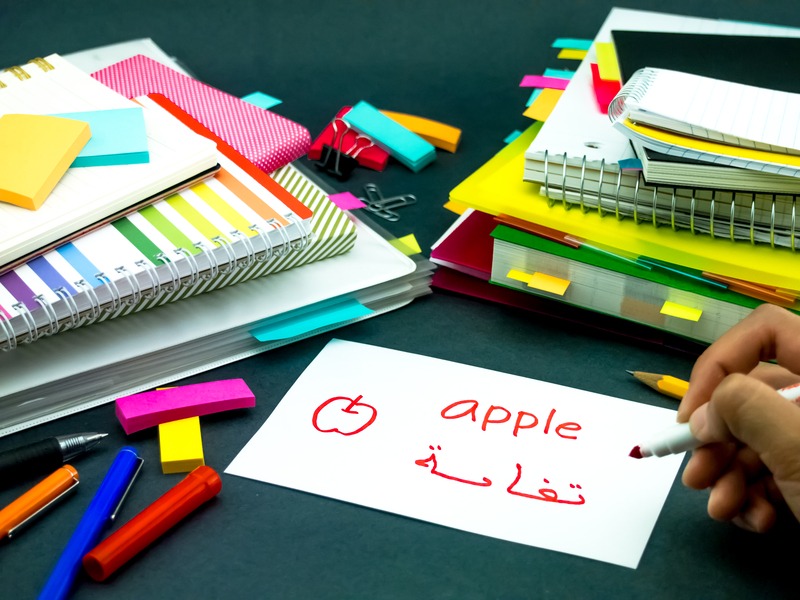Small classes
online lessons from home
Arabic lessons for beginners

We ask Allah the All-Hearing, All-Seeing and All-Knowing to remove any obstacles and facilitate us in achieving these goals, for He is the Almighty and the only one capable of doing so. Ameen Ameen Ameen!
Learn Arabic for beginners and Arabic for non-Arabs
Make ituse by the best way to learn Arabic
Arabic is a beautiful and rich language. But learning it can seem daunting. Fortunately, there is an easy way to master it. If you follow these proven steps, you can become fluent in Arabic in record time and surpass yourself. These proven steps won't just teach you how to learn Arabic. It is also the best way to become fluent in Arabic as a non-Arab.
There are more than 270 million Arabic speakers worldwide. With its worldwide importance, Arabic is definitely worth learning. And if you are passionate about the language, the people, the culture and the religion of Islam, you can use this motivation to become fluent even faster.
How long does it take to learn Arabic?
There is no universal number for how long it takes to learn a language. But we can give a rough estimate. The US Foreign Service Institute (FSI) came up with an estimate for how long it takes to learn Arabic for native English speakers. According to them, it takes 2,200 hours or 88 weeks to become fluent in Arabic. But take this with a grain of salt.
This scale takes into account the difficulty of the language compared to English. But it doesn't know your motivation, enthusiasm or what kind of language learning method you use. These all affect how long it takes to learn Arabic. And with the following method, it will definitely take less time to become fluent in Arabic.
Before you starts one Arabic course for beginners at the Tawfiq Foundation
You're probably eager to get started. But if you go into this great challenge well prepared, you will be better off in the long run. You ensure that you have a stable and profitable language learning experience. And you can also pencil away a few weeks/months from the FSI estimates.
1. Define your goals and motivation
Everyone learns a language for a reason. What is your reason? Do you want to travel to an Arabic-speaking country? Are you just fascinated by the culture? Or perhaps you aspire to read the Qur'an and read and understand the exegesis of the scholars? By keeping your motivation in mind, you can soon become fluent in Arabic.
Based on your motivation, you can easily determine which level of Arabic you want to achieve. This way you adjust your goal to the best way to learn Arabic for you. When you learn to travel, you need to stick to travel phrases. But if you want to have a conversation in Arabic fluently, you have to put in a little more effort.
2. Create a language learning schedule
The best way to prepare for learning Arabic is to create a language learning schedule. Therefore, plan your motivation step by step to know when you want to be fluent in Arabic. This is the most amazing trick to maximize your success.
Don't worry about whether learning Arabic will fit into your schedule. Finding hours in your busy day seems impossible. But you actually only need 20 minutes a day. And it doesn't even have to be 20 minutes of intensive studying. You can practice during your commute, at the gym, or while you're cleaning.
Once you have your schedule, stick to it and bite into it. This way you will soon learn Arabic successfully.
 3. Choose the right Arabic language resources
3. Choose the right Arabic language resources
The key to success in language learning is having the right resources and study materials. These methods must work for you. Everyone is different, so make sure you choose a tool that is tailored to you. It may be that our method is not the right one for you and we will always advise you to continue looking.
So, how do you know if the learning method you want to choose is effective? Well, if you like it and feel like you're going to make progress, then you made the right choice. Having fun is the most important part of learning a language.
There are many ways to learn the Arabic language. Some are free, online, apps and some can be very expensive too. Ultimately, if the method works for you, it's always worth the investment.
4. Focus on comprehensible input
The best way for non-Arab and what our method is is to learn Arabic with understandable input. This is a language learning theory by Stephen Krashen. We allow students to easily apply this technique in lessons with two simple steps:
- Target the study material at a slightly higher level than the current level.
- Make sure that a student understands everything from the context.
This way you as a student learn Arabic effectively. If your lessons are too easy, you will get bored. If they are too difficult, you give up. Getting comprehensible input can ensure that you are engaged and enjoying your Arabic lessons.
The best way to learn Arabic for beginners
I'm sure you'd like to know what specific steps you can take to learn Arabic. And without further ado, here they are. Please note that Arabic is a foreign language just like any other language. You must master Arabic grammar and vocabulary. But the most important thing is that you have to speak it. That's the fastest (and generally best) way to become fluent in Arabic.
1. Learn the Arabic alphabet
This first step is crucial. You must master the Arabic alphabet to read, write and understand the language. Fortunately, it is not as complicated as it seems.
There are 28 letters in the Arabic alphabet. All but one are consonants. This makes the Arabic alphabet almost an abjad, also called a vowelless script. But there is one vowel in the Arabic alphabet, so it's really just an impure abjad.
Arabic is written from right to left. Which may seem complicated at first, but you will get used to it very quickly. Even if you are left-handed, he will definitely enjoy it.
2. Learn common Arabic words and phrases
Learning a foreign language is not about how many words you know. It's about knowing the right words. Having the best vocabulary can give you a great advantage. You won't waste time learning unnecessary words in Arabic, only the most crucial words used by everyday Arabic locals.
But you might think that's still a lot of words. What if we told you that you actually only need 20% of Arabic vocabulary. That's because that 20% makes up 80% of everyday Arabic speech. It's called the Pareto principle. Learn only the most important Arabic phrases and speak fluently in record time.
 3. Remember more through spaced repetition of the lessons
3. Remember more through spaced repetition of the lessons
Once you've seen some common phrases in Arabic, you'll want to memorize them all. So wouldn't it be great if there was a way to hack your brain and easily store all that information there? Well, it actually already exists. It's called spaced repetition and it's the best way to learn Arabic in record time.
Your brain is always trying to forget. This psychological phenomenon is called the “forgetting curve”. And spaced repetition is the only way to combat this forgetting curve.
As a student, you can easily apply spaced repetition by periodically reviewing the material. The teachers of the Tawfiq Foundation also use this method when teaching. Go back a few days after your Arabic lesson and reread everything. You will remember more and more as you watch it repeatedly. Soon you will have all the information you want to know in your head and you will become familiar and motivated to get even more out of the lessons.
4. Master Arabic pronunciation
The Arabic language has many unique sounds. These do not exist in Dutch, but you can learn them. There are many tips for speaking Arabic. But there is one ultimate piece of advice: practice a lot and then practice a lot more.
Many language students leave their speaking skills last to practice. Maybe they're afraid of embarrassing themselves. Or they are not sure how to pronounce Arabic words correctly. Don't let the fear of learning a language limit you. It is important that you as a student start speaking from the first lesson to become fluent in the Arabic language.
If you as a student practice your speaking skills early, you will feel more comfortable and learning will go faster. And once you achieve that, nothing will stop you. You can achieve fluency quickly and easily.
5. Surround yourself with the Arabic language
The more you hear and practice Arabic, the faster you will become fluent. However, for many of us, traveling to an Arabic-speaking country is a luxury. But you can also bring Arabic to you. Learn about Islamic and Arabic culture, history and society from the comfort of your own home. These tips for learning Arabic are not only useful, they are also a lot of fun. Try a few to increase your knowledge of Arabic:
- Watch Arabic YouTube : YouTube is great because it's free. And there are plenty of Arabic YouTubers who can teach you the language. Listen to authentic Arabic online while streaming their videos.
- Listen to Arabic childrensongs: Singing along is a great way to learn languages and practice pronunciation. You hear the rhythm and melody of the language. And Arabic children's songs in particular are wonderful to listen to and participate in. Try singing to combine listening with a speaking exercise.
- Learn more about the Islam and the Arabic culture: Arab culture is deeply linked to Islam. This Islam has many traditions that are fascinating to learn about.
- Watch Arabic TV: Try tuning into an authentic Arabic TV channel and listen to locals and presenters who speak the language.
6. The best way to learn to speak and understand Arabic for beginners
There are many ways to learn Arabic. But these steps and the method of the Tawfiq Foundation are the ultimate guide to quickly learning to speak fluently.
The learning method for learning Arabic for beginners or learning Arabic for non-Arabs is a reliable method based on the science of teaching languages to non-Arabs. It gives you the most useful Arabic vocabulary so you can learn exactly how the Arabic people speak. And best of all, the teachers of the Tawfiq Foundation focus on the students and create a learning and study habit for a distributed learning repetition. You are guaranteed to remember your Arabic lessons. Easily learn to speak and understand Arabic fluently with the Tawfiq Foundation method!
How much do Arabic lessons cost for non-Arabic speakers?
Small classes or One on one
90 minutes Arabic lessons twice a week
Accounts
Free Trial
Free Trial
Free Trial
Free Trial
Free Trial
Projects
SSL
Storage
Domains
Domains
Sub domains
Learn Arabic
reading and speaking
Joint online classroom
70,-
MONTHLY INVESTMENT
~120 HOURS OF PROGRAM
Joint online classroom




(PLANNING, FOCUS AND PRODUCTIVITY)

(4-6 STUDENTS, MORE ADVANTAGEOUS, SPEAKING BREAKS, LISTENING TO OTHERS)

(COMMUNICATE MORE EFFECTIVELY: 80% RESULT WITH 20% EFFORT)







30 DAY MONEY BACK GUARANTEE
Learn Arabic
reading and speaking
One on one online
200,-
MONTHLY INVESTMENT
~120 HOURS OF PROGRAM
One on one online




(PLANNING, FOCUS AND PRODUCTIVITY)

(MORE INTENSIVE, MORE TALKING TIME, LESS FEAR OF SPEAKING, 100% ATTENTION)

(COMMUNICATE MORE EFFECTIVELY: 80% RESULT WITH 20% EFFORT)







NOT GOOD, MONEY BACK GUARANTEE
Islam, Quran and Arabic lessons
“Very nice way of conveying Islamic knowledge to children and parents.”
“My family situation and planning fit perfectly with your organization! Finally Islamic lessons for our children!”
“A soothing feeling that you do not belong to an institution or mosque. This way the focus is purely on the Islamic lessons.”
“It's about time that Islamic lessons for children and parents can be followed at home. It feels a lot safer at home.”
“Saves a lot of travel time, gas money and organization to an Islamic educational institution or mosque! Great solution for our children!”
“I have been saying this for years that it should be possible for children to take lessons from home. I am happy that as an organization you are moving with the times.”



We are not a commercial institution but are a self-organization that does not use or request government subsidies. We are a foundation that, when necessary, raises collections and asks for financial support and donations from its community. Our foundation will also organize benefits when the need is dire or progressive to safeguard the Islamic identity of Dutch Muslims. Our foundation also works as much as possible with its own working capacity, are free, independent and unbound and rely only on Allah as the Only Provider.
Doctrine of Faith (Aqieda)
Faith Practice (Ibada)
Character Formation (Achlaq)
Good manners (Adaab)
Arabic (Reading and Speaking)
| Your prayer times today | |
| Prayer | Time |
| Fajr | 04:40 |
| Shorok | 06:15 |
| Dohr | 12:43 |
| Asr | 16:14 |
| Maghrib | 19:11 |
| Source | 20:46 |
Tawfiq Foundation | Vacancies | Linkpartners
Terms and Conditions | Copyright 2019-2024
Biography Companions
Social Justice (ADL)
Biography of Prophet Muhammad
Interaction with people (Mu'amalat)
Learn to recite Quran for beginners

